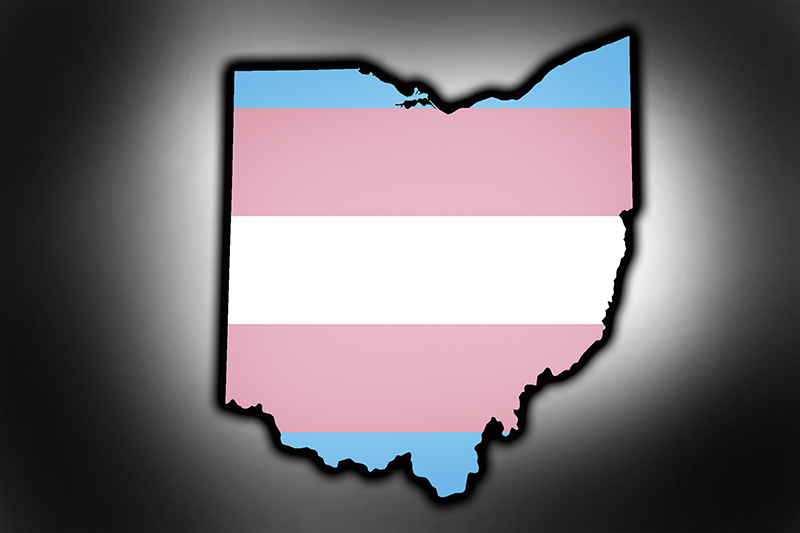North Carolina Republicans want to force teachers to “out” trans students to their parents
Bill also threatens doctors with loss of license, and allows therapists to subject LGBTQ people to conversion therapy without reprisal.

North Carolina lawmakers are pushing two bills attacking transgender youth’s ability to access gender-affirming health care treatments, including one measure that would force teachers to “out” trans or gender-nonconforming students to their parents — potentially putting them at risk of abuse.
The two bills are part of a larger slate of anti-transgender and anti-LGBTQ measures introduced by Republicans this year, and mirror nearly-identical efforts in 29 other states to restrict transgender individuals’ ability to live their lives without government interference.
Supporters of the bills claim they are trying to “protect” transgender and gender-nonconforming children from being subjected to “experimental” transition-related procedures that they may later regret undergoing.
Much of the outcry over gender-affirming treatments is based on misunderstandings around transgender health care, as well as the false assumption that parents allow their minor children to undergo certain treatments without careful consideration, or that trans children are undergoing surgical interventions, when in fact they may not even require it, and most physicians don’t recommend surgery until a person is of legal age.
The first health care bill, SB 514, would prohibit any transgender person under the age of 21 from receiving gender-affirming care, including puberty blockers, hormones, or surgery, and would penalize medical providers who prescribe or provide such treatments by revoking their medical licenses and fining them $1,000 per violation.
See also: Arkansas lawmakers override Gov. Asa Hutchinson’s veto of bill banning health care for trans youth
A provision within that bill would require any state employees — including teachers, school administrators or counselors — to “out” transgender or nonbinary students to their parents by informing them in writing of their child’s gender-nonconformity, even if doing so could potentially put the child at risk of abuse, homelessness, or even death.
“No government agent, nor any employee of this State, any political subdivision of this State, or any other governmental entity, except for law enforcement personnel, shall encourage or coerce a minor to withhold information from the minor’s parent,” the provision reads. “Nor shall any such employee withhold from a minor’s parents information that is relevant to the physical or mental health of their child and of a sort that parents interested in and responsible for the well-being of a minor reasonably would demand and should be apprised of.”
The penalty for refusing to “out” students could include discipline, up to and including suspension or termination, and would allow parents to sue teachers or counselors for damages for up to two full years after the alleged “violation” occurred.
The bill also protects practitioners of conversion therapy by preventing the government and any licensing organizations from penalizing those who offer “counsel, advice, guidance, or any other speech or communication, whether described as therapy or provided for a fee, consistent with conscience or religious belief.”

Another health care-related bill being pushed along with SB 514, would allow any medical provider — defined as including individual staffers at hospitals, nursing homes, clinics, or pharmacies — to refuse to provide treatment, perform procedures, fill medications, or even provide referrals to providers who will do those things, if they have a personal moral or religious objection to the type of treatment or care a patient is seeking.
That bill, known as SB 515, also allows insurance plans or employers to refuse to provide coverage for that care based on moral or religious objections.
LGBTQ advocates are understandably outraged at some of the bills’ provisions, comparing the proposed provisions to North Carolina’s infamous HB 2 “bathroom bill,” the 2016 measure that sought to limit restroom use by transgender individuals and sparked an economic backlash against the state for its perceive hostility to LGBTQ people.
The Associated Press previously estimated that the bill cost North Carolina more than $3.76 billion in potential revenues from lost business opportunities and other economic activity, due to boycotts, scuttled expansions of businesses, bans on official government-sponsored travel to North Carolina, and the loss of several sporting events in response to HB 2’s passage.
“Our state learned a lesson all too painfully with HB 2: Extreme bills that target LGBTQ people harm individuals, communities, and the fabric of our state itself,” the Rev. Jasmine Beach-Ferrara, the executive director of the Campaign for Southern Equality, said in a statement. “We’re working toward building communities across North Carolina where every LGBTQ person can thrive: That means being treated with dignity and respect, it means living free from discrimination, and it means being able to access the health care you need and deserve in your hometown.”

Kendra Johnson, the executive director of statewide LGBTQ organization Equality NC, called the introduction of the health care bills — particularly SB 514 — “heartbreaking, though not unexpected.”
“These attempts to control the bodies and medical decisions of parents and their transgender children are invasive, inappropriate, and outright dangerous,” Johnson said in a statement. “Decisions about a child’s medical welfare should be made between that child, their doctor, and their parents or guardians — not lawmakers. We cannot legislate the transgender community out of existence. It is the job of all lawmakers to understand the entirety of their constituency and mitigate challenges instead of creating barriers.”
Chantal Stevens, the executive director of the ACLU of North Carolina, called the bills “the latest in a series of coordinated attacks on health care access for trans and gender-nonconforming youth across the country, the true aim of which is to push trans and non-binary people out of public life.”
Noting that the bills are being pushed by some of the same conservative organizations that touted “bathroom bills,” as well measures purporting to protect “religious freedom” by allowing the denial of services to LGBTQ individuals and same-sex couples, Stevens urged lawmakers not to provoke a similar backlash to the one that occurred following passage of HB 2.
“Not only are these bills rooted in falsehoods, hate, and fear-mongering, but they also invade the private interactions between each of us and our medical providers,” Stevens said in a statement. “Just as North Carolina is recovering from the damage wrought by HB 2 on our reputation and economy, let’s move forward together to build equitable communities rather than doubling down on being a state that legislates hate.”
Read more:
Arkansas lawmakers send “sham” bill offering vague hate crime protections to governor’s desk
Failed GOP candidate and QAnon supporter goes on lengthy tirade against trans daughter
Support Metro Weekly’s Journalism
These are challenging times for news organizations. And yet it’s crucial we stay active and provide vital resources and information to both our local readers and the world. So won’t you please take a moment and consider supporting Metro Weekly with a membership? For as little as $5 a month, you can help ensure Metro Weekly magazine and MetroWeekly.com remain free, viable resources as we provide the best, most diverse, culturally-resonant LGBTQ coverage in both the D.C. region and around the world. Memberships come with exclusive perks and discounts, your own personal digital delivery of each week’s magazine (and an archive), access to our Member's Lounge when it launches this fall, and exclusive members-only items like Metro Weekly Membership Mugs and Tote Bags! Check out all our membership levels here and please join us today!



























You must be logged in to post a comment.